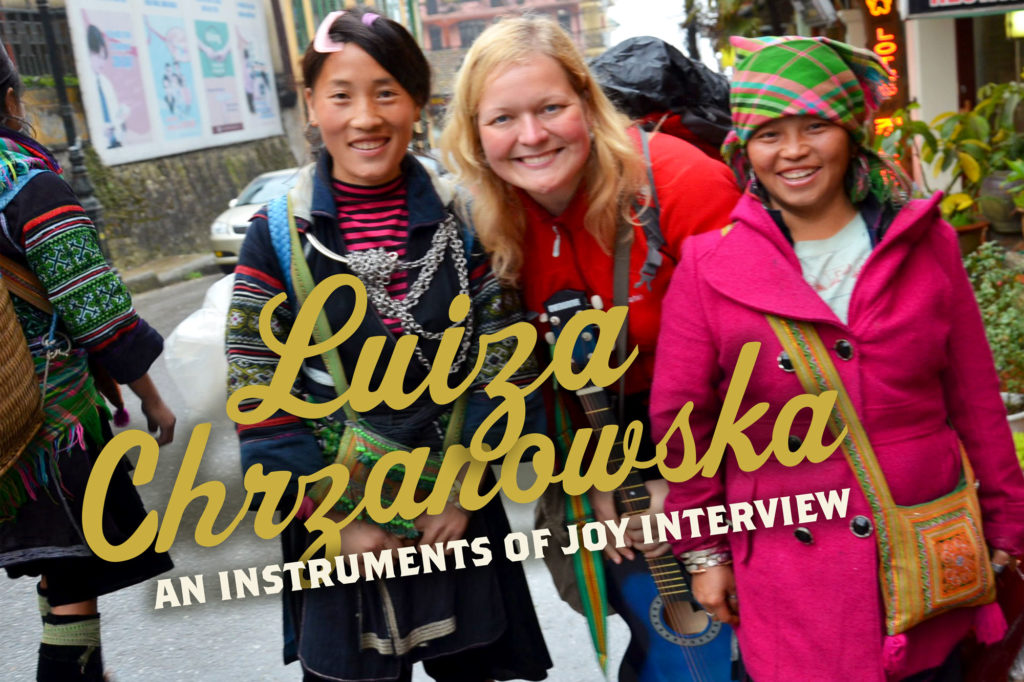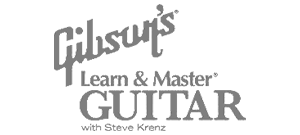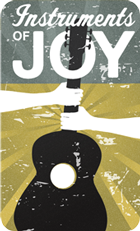IOJ INTERVIEW: LUIZA CHRZANOWSKA
IOJ: Thanks for joining us for a new special Instruments of Joy interview. Today we are joined by Luiza from Poland, and Luiza thank you so much for agreeing to share with us some of your wonderful stories of how you have used music to serve others around the world! And I want to start of just by asking you specifically how is it that you use music to serve others and where have you served around the world so far?
Luiza: Well, that’s a long story. I am Polish but I left my country 15 years ago. Now I am living in Belgium, but I used to live in Germany and Luxemburg over these years. I also love to travel and I had this opportunity, this blessing to travel for 14 months in Asia and South America. And out of all those country I can say I was serving in Poland, in Brussels, and shortly in Peru. That was mostly singing music in choirs, playing viola, teaching guitar, organizing music workshops. And out of those activities some others appeared like a week in Latvia, in Aloja. You were there with your band Paradigm Worship and I was there with the band based in Brussels The Sunshine Remedy. I say based in Brussels because this is where we met, but each one of us is from the different corner of the world. I play viola there, in this band, but feel more like God’s freelancer I would say. Whenever there’s a project where I know I can serve with music, I will just do it. I never say ‘no’.
IOJ: I love that. I think that God is looking for people are willing to go and who are willing to say ‘yes’ to what He asks. So right now, what is it that you are doing there and how does music play a part in what you’re doing?
Luiza: I still play viola in different projects and I sing in choir. About that I have a story which I want to share. It is about the choir in my diecese, in the area where I leave. I heard the choir every Sunday morning during the mass and I thought to join it, simply to serve with my voice, but the choir did not sound very good so I was hesitating. Well, I was even thinking ‘Oh my God, I just cannot listen to it’. On one hand I felt like okay, it’s my church I should go there and be there and serve there. On the other hand I felt like the inner musician, the inner perfectionist in me was just saying ‘No, you will not stand it. It’s just too much.’ So I was having this conversation inside of me which made me hesitate to go to the rehersal. Till one Sunday mass. I was in the church and there was lady next to me who was singing as well and she suddenly turned, took my arm and said to me: “But…You know you have to go to them, you have to sing with them, don’t you?” And then she let my arm go and she continued to sing as if nothing happened. And I really had that goose skin (*bumps*) because I felt like ‘Okay, if I really hear these words in the church–maybe it is a message from God who got really annoyed with my stubborn heart, and just gave me the straightforward message.’ So I went to the rehersal thinking I will just try once. I even was convinced it will be the last time I do it. So the first and the last time. I have seen that they are nice community, but musically it was demanding. So I promised myself not to make any comments but I did could not even wait 15 minutes, because they were singing something wrong, so I said: “You know maybe you should sing it that way because that how parts are.” I was a bit afraid that with my comments I would destroy this peaceful community you know? They are mostly elderly people so I did not want to be unpolite. But something completely opposite happened. Instead of being confused they just said: “Oh my God, we were praying so much for someone like you to come and to help us! For so many months we were praying all together for that. And here you are and that’s so amazing. Do you want to conduct this choir?” And I was like ‘What?’. So more or less, it was how I started with this choir and it really developed beautifully. You know it felt at the beginning I felt like they need me, but it’s more like…I understood that I needed them. That I needed to understand that singing and serving God is not about perfection. It’s about being in communion with others, and singing to God’s glory together. Well, if you want to listen to the perfect music you can go to the concert or you can listen to the CD. There are professional musicians for that, but this community really taught me that the focus is somewhere else. Of course we rehearse, we have workshops and work on the sound quality with small steps but I think this choir also rescued me, in a sense, to be more compassionate, to be more bonded with people, to put the focus somewhere else, not on the music itself, not on perfection but on praising God. And I see also how making music brings this community together.
IOJ: And why also do you think that music is such a powerful tool to impact others?
Luiza: I think it’s a part of Heaven. I really think–I hope so–I wait for that, that once we are staring face to face with God, it will be just endless music and worshipping. So when we sing, it’s just part of the Heaven we have. And I really believe that with the music you can touch people’s hearts, you can make some fun, you can build bridges between people, it’s like a language that’s international. You don’t even need to speak the same language as the people you are connecting with through music. And you can still connect. You can heal through the tones, through the words you are singing. You can bring messages. I think because you have lyrics but with music, so it’s like double powerful. It stays in your mind. That’s why it’s powerful.
IOJ: And do you have any specific stories or experiences that you can share where you have seen music accomplish that?
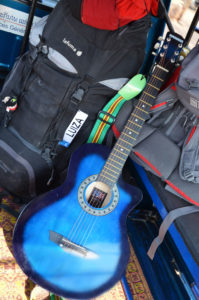 Luiza: Well I have a few stories to share from my traveling time. And one of my favorites is the story of “Blue Guitar”. I went on my trip and I started in Thailand, in Bangkok. I brought with me a ukulele because I really wanted to learn how to play it. And I thought “Okay, during my travels I will really have time to do so.” But when I was leaving two days later to Chiang Mai I realized in the bus that I left my ukulele in the hotel. So I was like: “Oh, no!” And I called the hotel and I asked them to keep it for me – it was still there – because I was about to be back in 6 weeks. But when travelling in the northern Thailand I was missing music very much, and I felt a bit lonely; it was the beginning of my trip. And I was walking the streets in Chiang Mai, in the North of Thailand when I see some music shop. It was funny, because afterwards I have never seen a music shop again in Thailand, but that day it literally crossed my path. So I entered and I saw that guitar. It was blue in color. It was really
Luiza: Well I have a few stories to share from my traveling time. And one of my favorites is the story of “Blue Guitar”. I went on my trip and I started in Thailand, in Bangkok. I brought with me a ukulele because I really wanted to learn how to play it. And I thought “Okay, during my travels I will really have time to do so.” But when I was leaving two days later to Chiang Mai I realized in the bus that I left my ukulele in the hotel. So I was like: “Oh, no!” And I called the hotel and I asked them to keep it for me – it was still there – because I was about to be back in 6 weeks. But when travelling in the northern Thailand I was missing music very much, and I felt a bit lonely; it was the beginning of my trip. And I was walking the streets in Chiang Mai, in the North of Thailand when I see some music shop. It was funny, because afterwards I have never seen a music shop again in Thailand, but that day it literally crossed my path. So I entered and I saw that guitar. It was blue in color. It was really 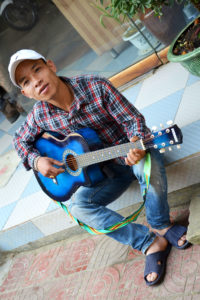 really pretty. And I liked it so much because of the color. So I thought “Oh, maybe I could buy it.” But it was too expensive. So I asked the guy “Would you mind if I would play a bit in the corner?” And he said, ”No problem, you can do that.” So I sat down in the corner and I started to play a song. That’s another story: It was a very special song which I got from a friend. Actually it’s a friend from a band, the Sunshine Remedy, who used to play [with us]. His name is James Brown. He had a song that really stuck in my head because of the music and I asked him if I can have this song for my traveling, and he said ‘yeah sure, no problem’. And he gave me the lyrics. So I was sitting in this shop and I took the paper with lyrics and it was actually my first time living them through singing. And I realized that the lyrics of this song are touching me so much. The title of the song is “Looking for Easy Answers”. The song says that we are looking for easy answers and we are looking in the wrong places, like in our mind, or in our past, or in our experiences, or in the experiences of other people. But there are no easy answers and we are also searching in wrong places, because the only answers come through God. So I was sitting in that shop and playing it over and over till the lyrics got into my mind. But I also realized that people were gathering and they were curious but they were also pleased to hear it. So finally the guy, he sold me this guitar for – I don’t remember exactly – for twenty-something dollars. And he even added a belt for it. That was really so nice! And I had new travelling companion – this blue guitar.
really pretty. And I liked it so much because of the color. So I thought “Oh, maybe I could buy it.” But it was too expensive. So I asked the guy “Would you mind if I would play a bit in the corner?” And he said, ”No problem, you can do that.” So I sat down in the corner and I started to play a song. That’s another story: It was a very special song which I got from a friend. Actually it’s a friend from a band, the Sunshine Remedy, who used to play [with us]. His name is James Brown. He had a song that really stuck in my head because of the music and I asked him if I can have this song for my traveling, and he said ‘yeah sure, no problem’. And he gave me the lyrics. So I was sitting in this shop and I took the paper with lyrics and it was actually my first time living them through singing. And I realized that the lyrics of this song are touching me so much. The title of the song is “Looking for Easy Answers”. The song says that we are looking for easy answers and we are looking in the wrong places, like in our mind, or in our past, or in our experiences, or in the experiences of other people. But there are no easy answers and we are also searching in wrong places, because the only answers come through God. So I was sitting in that shop and playing it over and over till the lyrics got into my mind. But I also realized that people were gathering and they were curious but they were also pleased to hear it. So finally the guy, he sold me this guitar for – I don’t remember exactly – for twenty-something dollars. And he even added a belt for it. That was really so nice! And I had new travelling companion – this blue guitar.
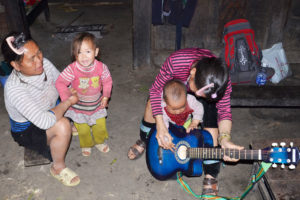 So I was traveling with this guitar all over Southeast Asia. The instrument was really an excellent ice-breaker. I mean if you let me out now in the world I can talk to anyone but at the beginning I was not really self-sure, a bit shy. For me this guitar was a blessing because it was like an ice-breaker: people just wanted to touch it, people wanted to play it. That was exactly that; I couldn’t speak their language but we could laugh together and play some music together or they could listen.
So I was traveling with this guitar all over Southeast Asia. The instrument was really an excellent ice-breaker. I mean if you let me out now in the world I can talk to anyone but at the beginning I was not really self-sure, a bit shy. For me this guitar was a blessing because it was like an ice-breaker: people just wanted to touch it, people wanted to play it. That was exactly that; I couldn’t speak their language but we could laugh together and play some music together or they could listen.
I remember traveling with this guitar in Vietnam, I went to the village of Hmong that are native people on the border of Vietnam and China. I met some indigenous girl on the market and then she took me to her village. There were no other tourists or backpackers, only me, so the news spread out that there is some visitor. And the villagers were passing by as they were curious who I was. I could not communicate with them in their language so I just gave them the guitar. They tried to play it and we laughed a lot. It was for me the example how you can connect through music and through instruments.
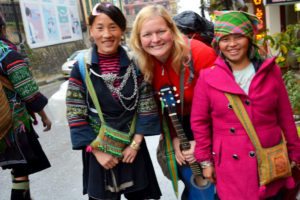 One other story I want to share is linked to a place which is very special to me. It is called Casa Hogar Juan Pablo Magno in Peru, in Lurin near Lima. It is a place for orhans. True ones and and social orphans. They had really hard stories behind them, really, really tough. So I was volunteering there and giving music lessons, also singing. I met there very charismatic missionary priest, Father Joe, who plays excellent guitar. And we were singing together. He is really inspiring person. He was also teaching kids songs and playing guitar. I think that music just lifted them up and was helping them to forget about what they went through, even if only for a moment, but it was so beautiful to see the joy and passion for music in those kids. And you could see how they shine when they play or try to play, how they got involved, like there was some new meaning to them.
One other story I want to share is linked to a place which is very special to me. It is called Casa Hogar Juan Pablo Magno in Peru, in Lurin near Lima. It is a place for orhans. True ones and and social orphans. They had really hard stories behind them, really, really tough. So I was volunteering there and giving music lessons, also singing. I met there very charismatic missionary priest, Father Joe, who plays excellent guitar. And we were singing together. He is really inspiring person. He was also teaching kids songs and playing guitar. I think that music just lifted them up and was helping them to forget about what they went through, even if only for a moment, but it was so beautiful to see the joy and passion for music in those kids. And you could see how they shine when they play or try to play, how they got involved, like there was some new meaning to them.
IOJ: And in your travels, have you seen the role or importance of music change from culture to culture? And what has that taught you about music?
Luiza: I think on one hand, I feel like okay more or less all over the world, it’s the same. Music is bringing people together, it’s socializing, it’s ice-breaker, it’s healing. But on the other hand, of course in Asia, it’s like spirituality, like spiritual mantras. I think that’s mostly where you use music, or I had that impression. Mongolia, that’s a really special country, because music there is an example of unity with nature. The way they sing, the way they play, like when they play their instrument it’s like a little cello and with the rhythm as if horses were galloping. They can also do the throat singing, like singing very low notes, then over it whistling the melody. So one person can sing like two voices. That’s amazing. That’s very special from Mongolia. When you listen to the songs, you just see nature: you see mountains, you see horses, you listen to the wind. In South America, it’s more emotions, and passion, and dancing. They dance along the city everywhere, like in the bus. Always there is music. If there is no music, someone will sing, and nobody’s bothered about it. Cause it’s just normal. If you would sing in Europe on the bus, people would just look at you like ‘Huh, what is he doing?’ What I love is the variety. The variety of different means and of different music. Somebody once said that everything already was written, we just repeat the same tones and everything, but I don’t believe that. We can so much take from each other and combine the elements. And I think through using different means, you can reach different people. You can have dance music and still give some messages which are good messages. For those who prefer jazz, you can put it into jazz. Using different means, different music to pass through the messages you want. I’m thinking now about worshipping. I think in worship, we are a bit accustomed to the song does. They’re great, absolutely, but I think there is so much more to explore, to go outside (of those boundaries) and to bring different forms of worshipping.
IOJ: Can you share how music has impacted you and your life?
Luiza: I think that music was my connection to God, really. Like my turning point. I had twice in my life points when I was a bit far away from God. And then He turned me back, like pulled me toward Him because He used the music. One story was it was the year 2000, and I was kind of rebel student. I was a bit far away from church. I was going on Sundays, but not really you know it was on the surface. I had friends that were doing a worshiping tour, and one alto just got sick. And they asked me “Hey, do you want to jam in this place. Do you want to sing with us?” And I said ‘yeah, sure’. But I did it because I liked music, I wanted to sing. I really didn’t think worshiping or not, doesn’t matter. It was a new adventure, singing in a band, having concerts. And I went for this worshiping tour. And then, I don’t remember, on the second or third day, I really realized what I’m singing, like the words really went into my heart and so touched me, and I was just like you know on my knees and I started to cry. And then I realized what I’m singing, and for whom I’m singing. And then I went to the choir in the church, to start my service in the church through the music because of that experience. I feel like if God touched me through the music, to pull me toward Him, he probably does it with others as well. So, when I play, when I’m His instrument, I think He can pull others as well. Wow, I just cannot imagine my life without music. I’m speaking a lot about worshiping, but I like to dance, everything that’s linked to the music. I do Salsa, I do Tango, I do Lindy Hop now. It’s a lot of fun. It just brings joy. If I want to get my mood lifted up, I just do music. I sing or I listen to or I do it actively, so I play or I dance. And I cannot even say how many great friends I met through music or through this activity. For example, we would never have met, if I didn’t play. Probably we would never have met in Latvia, and I’m grateful really we did.
IOJ: I know, me too! I feel the same way about that. I have seen music as a unifying tool bring people together from different cultures and nations for a common purpose or goal. And it’s really beautiful how it’s a quick way to make new friends even when you have other things in your life that are very different (such as where you live or languages you speak!). So our last question, I just want to know why it is that you think it’s important to play music, to play an instrument, to give instruments away, or to write songs.
Luiza: I have this good example, this excellent example in Peru, when I really had seen the poverty, like in everyday where you have stories, you have pain to deal with, how it can bring you to a different level, like opening doors to a different world. Listening to music or playing it, it’s like healing of the soul. I really believe that. I’m really grateful you put together all these questions, because it really makes me so joyful now to summarize it in my head to understand how important music is for me. Cause you know, I think some gifts of God we take for granted that they are there, so we are just not thinking. Like we can walk, we can see, we can sing and that’s so obvious we can do it. We want more and more things that we don’t have, but these gifts are just amazing.
IOJ: That’s exactly right, and that’s why we think it is so important for people to hear stories like yours of how music is tangibly impacting others and the power that music can have. And that’s why we at Instruments of Joy think that it’s so important to give instruments away and to equip people with music. So thank you so much for joining us Luiza and sharing your stories and experiences!–I know that many listening will be inspired by what you have said.
For those who are tuning in, if you are inspired to act and respond in some way, whether it’s hosting a concert, donating an instrument, or donating money so that we can purchase instruments to send around the world, please visit our donate pages and continue to follow us on social media!
